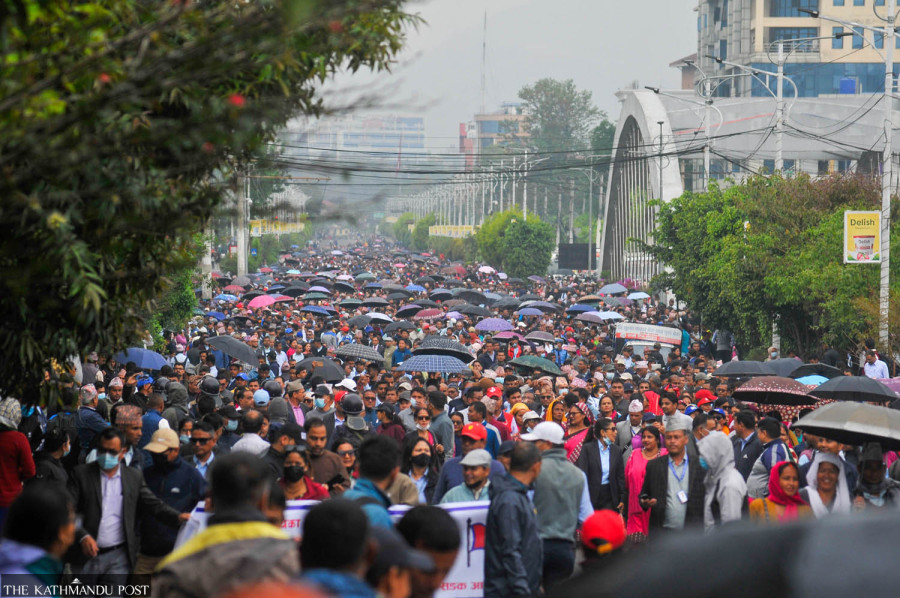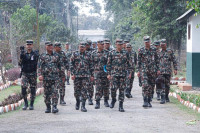National
Teachers’ continued demonstrations could affect academic calendar
Delay in commencing the evaluation of the SEE answer sheets has officials worried.
Post Report
Had everything been normal, the secondary-level teachers would have been busy marking the answer sheets of the Secondary Education Examinations (SEE) that concluded two weeks ago.
The Office of the Controller of Examinations has stored the answer sheets in the designated places for marking. However, no teacher has shown up to mark them, as per the decision of the Nepal Teachers’ Federation, which is staging regular protests in the federal capital demanding immediate enactment of the school education law.
The examination controller's office has already announced the SEE results would be released by June 21—within three months of the test. However, the delay in commencing the evaluation of the answer sheets has worried the officials.
“We are already late as per our calendar,” Ganesh Bhattarai, the examination controller, told the Post. “Delay in the SEE results will affect the entire academic calendar. Therefore, we have regularly requested the teachers to mark the answer sheets while they continue their protest. This is directly related to the future of half a million students.”
As many as 514,017 students from 11,216 public and private schools took the tests held in March. Among them, 257,730 are female, 256,311 are male, and 30 fall under the other category.
Though the teachers’ representatives and the Ministry of Education are in regular dialogue, there has not been a breakthrough yet. The federation has hinted at dropping its demand not to work under the local governments, given that the government agrees to address other issues related to pay and perks and guarantee the promulgation of the law.
The teachers have been demanding an increment of salary of Early Childhood Development facilitators. The ministry has agreed to give them a hike of Rs2,000 a month. It has said the issues relating to a dedicated hospital and other demands can be addressed through the policies and programmes and the national budget for the next fiscal year.
The policies and programmes and national budget will be presented in Parliament next month.
“We are in regular talks. The government is ready to address all the genuine demands. Some of them can be done immediately while others need planning,” Shiva Sapkota, spokesperson for the ministry, told the Post.
The teachers are demanding the benefits on par with civil servants. For instance, if a civil servant dies after serving for 15 years, their family can choose between a gratuity or a pension. However, in the case of teachers, there is a discriminatory provision requiring a mandatory service of 20 years.
Similarly, there is also discrimination in grade promotions between civil servants and teachers. Civil servants receive a grade after 11 months and 16 days of permanent service, while teachers must wait for an entire academic session to receive a grade.
Sapkota said the ongoing protest has drawn the attention of the state, considering that the government and a parliamentary committee are working rigorously to address them.
“As the state is seriously working towards addressing their concerns, we request the teachers to discontinue the protest. Further continuation means it will affect the school calendar,” he said.
The new academic session starts on Tuesday. While the enrollment campaign continues in the first week, teaching-learning has to start from the third week of April. “We believe teachers are equally concerned about the students,” Sapkota said.
The agitators, however, say they had to resort to a strike in the schools as the government did not listen when they presented their demands through other means. The teachers had submitted a memorandum to the government and political parties and staged sit-ins before the party offices and education offices before taking to the streets.
“We were compelled to come to Kathmandu. We are not returning without the law in place,” said Laxmi Kishor Subedi, the chair of the federation.




 10.17°C Kathmandu
10.17°C Kathmandu













